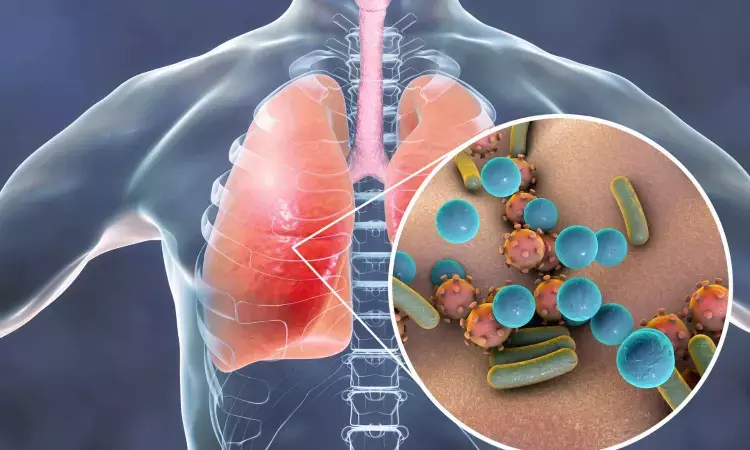- Home
- Medical news & Guidelines
- Anesthesiology
- Cardiology and CTVS
- Critical Care
- Dentistry
- Dermatology
- Diabetes and Endocrinology
- ENT
- Gastroenterology
- Medicine
- Nephrology
- Neurology
- Obstretics-Gynaecology
- Oncology
- Ophthalmology
- Orthopaedics
- Pediatrics-Neonatology
- Psychiatry
- Pulmonology
- Radiology
- Surgery
- Urology
- Laboratory Medicine
- Diet
- Nursing
- Paramedical
- Physiotherapy
- Health news
- Fact Check
- Bone Health Fact Check
- Brain Health Fact Check
- Cancer Related Fact Check
- Child Care Fact Check
- Dental and oral health fact check
- Diabetes and metabolic health fact check
- Diet and Nutrition Fact Check
- Eye and ENT Care Fact Check
- Fitness fact check
- Gut health fact check
- Heart health fact check
- Kidney health fact check
- Medical education fact check
- Men's health fact check
- Respiratory fact check
- Skin and hair care fact check
- Vaccine and Immunization fact check
- Women's health fact check
- AYUSH
- State News
- Andaman and Nicobar Islands
- Andhra Pradesh
- Arunachal Pradesh
- Assam
- Bihar
- Chandigarh
- Chattisgarh
- Dadra and Nagar Haveli
- Daman and Diu
- Delhi
- Goa
- Gujarat
- Haryana
- Himachal Pradesh
- Jammu & Kashmir
- Jharkhand
- Karnataka
- Kerala
- Ladakh
- Lakshadweep
- Madhya Pradesh
- Maharashtra
- Manipur
- Meghalaya
- Mizoram
- Nagaland
- Odisha
- Puducherry
- Punjab
- Rajasthan
- Sikkim
- Tamil Nadu
- Telangana
- Tripura
- Uttar Pradesh
- Uttrakhand
- West Bengal
- Medical Education
- Industry
Doxycycline may Reduce Risk of Clostridioides difficile Infection in community acquired Pneumonia patients

A recent retrospective analysis conducted in Veterans Affairs Hospitals across the United States suggests that doxycycline, a commonly used antibiotic, is associated with a lower risk of Clostridioides difficile infection (CDI) compared to azithromycin, particularly when used in the treatment of community-acquired pneumonia (CAP).
The study, published in the American Journal of Infection Control, involved an analysis of approximately 156,107 hospitalized patients diagnosed with CAP who received care at Veterans Affairs Hospitals. Researchers, led by Ashley L. O'Leary, Pharm.D., from the Veterans Affairs Western New York Healthcare System in Buffalo, aimed to investigate the potential link between doxycycline use and CDI risk reduction.
Their analysis revealed compelling findings. When doxycycline was used alongside ceftriaxone for pneumonia treatment, it demonstrated a 17% lower risk of CDI compared to azithromycin (P = .03). Moreover, among patients with a previous history of CDI, doxycycline use exhibited a significant reduction in the incidence of CDI by a substantial 45% (odds ratio 0.55; P = .02).
Senior author Kari A. Mergenhagen, Pharm.D., also from the Veterans Affairs Western New York Healthcare System, highlighted the significance of these results. "Our analysis found that in patients with a prior history of C. diff, doxycycline was the only factor associated with a reduction in the incidence of new C. diff infections," said Mergenhagen. "These results suggest that in cases where Legionella pneumonia can be ruled out prior to treatment, patients at increased risk of C. diff may benefit from the use of doxycycline as a first-line agent."
These findings provide valuable insights for clinicians treating patients with CAP, particularly those with an elevated risk of CDI. The study implies that doxycycline could be considered as a preferred first-line agent for atypical coverage in pneumonia treatment, especially when Legionella pneumonia is not a concern.
Reference:
O’Leary, A. L., Chan, A. K., Wattengel, B. A., Xu, J., & Mergenhagen, K. A. Impact of doxycycline on Clostridioides difficile infection in patients hospitalized with community-acquired pneumonia. American Journal of Infection Control,2023. https://doi.org/10.1016/j.ajic.2023.09.007
Dr Riya Dave has completed dentistry from Gujarat University in 2022. She is a dentist and accomplished medical and scientific writer known for her commitment to bridging the gap between clinical expertise and accessible healthcare information. She has been actively involved in writing blogs related to health and wellness.
Dr Kamal Kant Kohli-MBBS, DTCD- a chest specialist with more than 30 years of practice and a flair for writing clinical articles, Dr Kamal Kant Kohli joined Medical Dialogues as a Chief Editor of Medical News. Besides writing articles, as an editor, he proofreads and verifies all the medical content published on Medical Dialogues including those coming from journals, studies,medical conferences,guidelines etc. Email: drkohli@medicaldialogues.in. Contact no. 011-43720751


